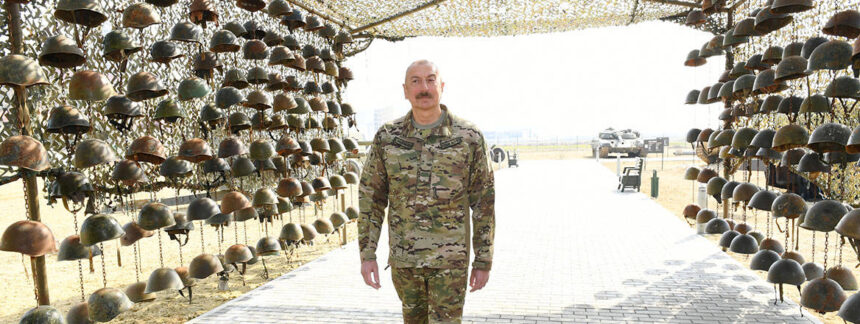Summary by Geopolist | Istanbul Center for Geopolitics
The article from RUSI explores the dilemma faced by Western countries in dealing with Azerbaijan following its victory in the Karabakh conflict. Despite Azerbaijan’s authoritarian governance, military aggression, and human rights abuses, the West has increasingly engaged with it for geopolitical and economic reasons, particularly in energy. This pragmatic approach risks repeating past mistakes made with other authoritarian regimes. The article underscores the tension between pursuing strategic interests and upholding democratic values, warning that overlooking Azerbaijan’s actions could lead to future instability.
For more details, read the full article here.
As Azerbaijan’s leader revels in his victory in the recent Karabakh conflict, the West faces the all-too-familiar choice of whether to engage with an unsavoury regime for geopolitical gain, or to stay true to its values in the global struggle between democracy and authoritarianism.
Azerbaijan’s success in Karabakh has sealed President Ilham Aliyev’s legacy, finally drawing him out of his father’s shadow. Yet, amid the celebration of reunification, the population is beginning to refocus on domestic issues, namely the repression of political opposition and media freedoms by the state. Azerbaijan’s rapid rise in geopolitical influence places it in a dominant negotiating position over Armenia. However, months after they began, peace talks are still meandering in the preliminary stages. Ultimately, peace does not suit Aliyev, and the West should be cautious about repeating the same mistakes that it made with Ukraine.
After three decades, Azerbaijan finds itself without a foreign military presence within its borders, symbolising its emergence as an independent global actor pursuing its own interests. Now a rising power within the region, Azerbaijan is poised to leverage its position as a bridge between the West and Central Asia, bolstered by increased European imports of Azerbaijani fossil fuels. Through an emerging multi-vector foreign policy, Azerbaijan is cautiously balancing relations between the West and Russia. However, Aliyev’s increasing military spending and irredentist state rhetoric underscore potential territorial ambitions, which should send a clear warning signal to the West.
Does Azerbaijan Need Peace?
The peace process between Armenia and Azerbaijan has been a stagnant one. Border skirmishes, domestic unrest, and a long-held mutual distrust have impeded prospects of peace. Yet, the recent transfer of four villages from Armenia’s Northeastern Tavush province to Azerbaijan is a decisive move in delineating the Armenian-Azerbaijani border, as well as a crucial positive step towards a sustainable peace agreement after three decades of war. Despite this progress, there is a clear imbalance in the momentum emanating from Yerevan and Baku, with the latter clearly much more languid in its efforts. Despite Armenian concessions, Azerbaijan still occupies internationally recognised Armenian territory and, after the flight of 120,000 Armenians from Nagorno-Karabakh, has set about bulldozing Armenian settlements within the region, including the destruction of churches and monuments. Baku is well aware of its military dominance within this dyadic relationship, and this confidence has led to prolonged peace negotiations which are frequently stalled by Azerbaijan’s strategic manoeuvring. For example, the issue of the Zangezur corridor – a proposed transit route for Azerbaijan to its exclave of Nakhichevan – has transformed from a suggestion to an outright demand before a peace deal can be agreed upon.
Given the significant historical grievances between them, difficult concessions will need to be made by both sides. However, further increasing the concessions forced upon Armenia could exacerbate domestic protests, which are already destabilising this young democracy. This situation heightens the threat of Armenian populist movements, as evidenced by Arch-Bishop Bagrat Galstanyan’s ‘Tavush for the homeland‘ campaign.
Aliyev’s increasing military spending and irredentist state rhetoric underscore potential territorial ambitions, which should send a clear warning signal to the West
Currently, the status quo suits Azerbaijan’s interests, enabling it to continue to extract concessions from Armenia without an urgent need for a definitive peace settlement, as long as its unchallenged regional dominance continues. Following Aliyev’s landslide election victory, he finds himself at the pinnacle of his political career. With the successful operation in Karabakh under his leadership, he has effectively emerged from his father’s shadow, securing his legacy as an Azerbaijani national hero.
However, while Aliyev basks in his geopolitical triumph, domestic challenges remain prevalent. Press freedoms are increasingly restricted, with complete state control of domestic media, harassment and detainment of independent journalists, and a foreign agent law seemingly inspired by Russia’s oppressive media strategy. Political dissidents and oppositional civil society are blackmailed, arrested and tortured, with any challenge to Aliyev’s rule quickly stifled. It is important not to forget that Aliyev’s 92.12% win in the February elections was achieved through total media control and boycotts by the political opposition. While Azerbaijan’s economy has soared over the last decade, it remains dependent on fossil fuel exports, with increasing regional wealth disparity between Baku and other provinces, impacting educational standards among the rich and poor. Azerbaijan’s Dutch disease has previously led to rapid inflation, with little having been done to rectify the situation, save for a number of renewable energy projects aimed at increasing gas exports. Meanwhile, Aliyev continues to put an emphasis on greater militarisation, increasing defence and national security spending to 17.4% of the state’s budget. Now that Karabakh is unequivocally Azerbaijani and Armenia is looking to ameliorate relations, Azerbaijani society can finally refocus its attention on domestic concerns, and with this, even Aliyev’s manufactured support may struggle in the face of public discontent.
While both states suffer from irredentist elements within their constitutions, Azerbaijan’s military strength and authoritarian governance represents a much more pressing concern for regional stability. The concept of ‘Western Azerbaijan’ – the idea that further Armenian territory historically belongs to Azerbaijan – has been utilised within the Azerbaijani parliament, with Aliyev also known to include this rhetoric in his speeches. Exploiting nationalist tendencies is a tried and tested method used by authoritarian states to divert the population’s attention away from the failings of the state.
In a similar manner to the Argentine military junta and the Falklands, or Vladimir Putin and the annexation of Crimea, one can expect to see Aliyev using this conflict to shore up his domestic political support when it ultimately begins to slide, as well as a clear trend towards exploiting ingrained anti-Armenian sentiments within Azerbaijani society. By fostering animosity towards Armenia, Aliyev will effectively consolidate power with minimal internal dissent. Aliyev’s political stronghold benefits from the current situation; Armenia is a convenient scapegoat, and the prospects of a sustainable peace agreement remain rocky.
The West appears to only be paying nominal attention. Yet not only is this issue playing out in Europe’s backyard, but it represents a microcosm of the rising global struggle between democracy and authoritarianism.
Treading on the Same Rake?
Russia’s full-scale invasion of Ukraine is a stark reminder of the threat posed by authoritarian regimes to Western security. While Azerbaijan’s policies may not directly threaten the West, its equidistant approach between Russia and Western powers raises significant concerns. As the West deepens its economic ties with yet another authoritarian state, the mirroring of errors made over the last decade is obvious, with the West indirectly financing another authoritarian state’s military ambitions.
Should the West escalate its dependence on Azerbaijani fossil fuels, it risks a recurrence of the Ukraine scenario, with Armenia paying the price for Western negligence. The ongoing tension between democracy and authoritarianism may require morals to take a backseat, but the West’s inconsistent adherence to its proclaimed values is exacerbating its global image problem. The consolidation of authoritarian power in the South Caucasus further erodes the foundational principles of the West, posing a direct challenge to its core values.
As the West deepens its economic ties with yet another authoritarian state, the mirroring of errors made over the last decade is obvious
By overlooking the risks associated with increasing economic support for another militarising authoritarian state, the West is demonstrating a failure to learn from repeated examples of authoritarian aggression. Despite Azerbaijan’s displays of concern over the threat of sanctions, the West has yet to fully leverage its economic weight to incentivise stability in the region.
This raises a pertinent question over the future of Western rules-based ideals: do current geopolitical tensions require a pragmatic adaptation, or is supporting democracy in an increasingly authoritarian world a cornerstone of the liberal international order? Regardless of the decision that it comes to, if the West is to survive multipolarity, its stance must be clear and consistent. Peace is beneficial for the South Caucasus, but it may not suit its most powerful politician. The chances of conflict remain high in the region as long as the West fails to learn from its mistakes.
By: Callum Fraser
Source: Royal United Services Institute (RUSI)







